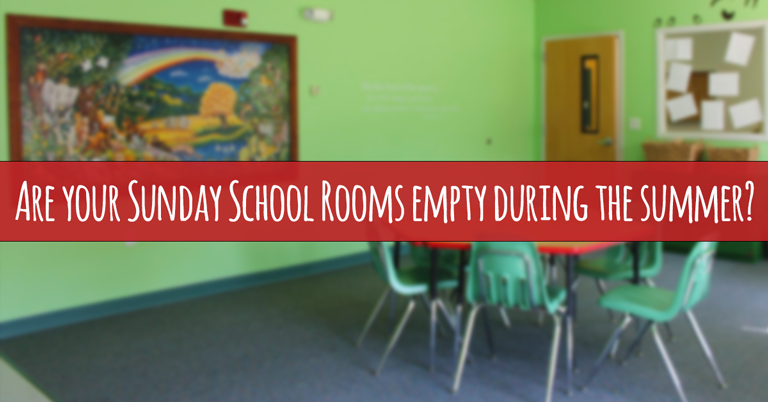 Having served churches in Idaho, California, Oregon and Illinois, I can predict the conversations that many of you are having about summer Sunday School during staff meetings now that we’re in the post-Easter era of the church calendar year. That conversation might go something like this:
Having served churches in Idaho, California, Oregon and Illinois, I can predict the conversations that many of you are having about summer Sunday School during staff meetings now that we’re in the post-Easter era of the church calendar year. That conversation might go something like this:
Senior Pastor (SP): So, what do we have planned for summer Sunday School?
Children’s Pastor (CP): Yah…we’re still trying to decide if we are going to offer something.
SP: Okay – but we want to continue to offer something for our children during worship, because if we don’t, young families will just stop coming to worship during the summer.
CP: Right – but even when we offer something – people don’t come. Or we might get 1-2 kids one week, 3 the next week, and none the week after that. Besides, our teachers need a break after teaching throughout the school year.
SP: Okay – well, we can just get the youth to do it. The youth can just teach, right?
Youth Pastor: . . .
(the youth pastor says nothing, but simply loves the fact that the youth just got volunteered for something else in the church that no one else wants to do)
SP: Okay – scratch that. Well, what are we going to do?
CP: Honestly? I don’t know. We have the same conversation every year. The year that we decided to give teachers a break, which they deserved, and didn’t offer anything for children, some parents complained that there wasn’t anything for their kids to do, and so they didn’t want to come to church. But then the next year, when we did offer a summer Sunday School program for children, our teachers got burned out and weren’t very excited about starting up again in the fall for Kickoff Sunday. Besides, they would often put in a decent amount of prep time, gathering supplies, learning a lesson, making copies, etc., and then only little Jimmy would be there. And we all love little Jimmy…and little Jimmy loves this church – but that’s a hard place for a kid to be – the only kid there with the teachers? Who wants to be that kid?
SP: Okay – great. So, what I hear you saying is that we ARE going to have summer Sunday School?
Summer Sunday School
I’ve sat through this conversation so many times. And it’s not an easy one. I don’t think churches want to make program decisions that will cause kids and families to not want to come to worship in the summer. But it’s really hard to convince people to do summer Sunday School when you don’t know if people will be there or not, and it is often hard to find reliable Sunday School teachers for the summer.
So a church can decide to do nothing, and just accept the fact that they may see families less during the summer, or they can decide to put together a summer program, and then be frustrated when families don’t come and deal with frustrated teachers who have prepped lessons for no one.
I know there are some churches out there who have found creative solutions to this problem, and if you are one of those, I’d love for you to share some of your findings in the comments below. Or maybe you’re a church that is right in the middle of trying to figure out this decision for your community. Let us know what factors you’re considering as you think about this issue.
Little to no prep, flexible, adaptable and fun
Now, if only there was someone who was working on a curriculum that would be flexible, adaptable, fun and hopefully something that would require little to no prep for teachers. Something that a teacher could simply walk in and lead without having to spend time throughout the week prepping for a lesson. Something that would be a fun experience for 5 kids if they showed up one Sunday, and something that wouldn’t cause the teacher any frustration if no one came the next Sunday, because they didn’t have to work on getting the lesson ready.
If only there was someone who was going to announce a curriculum just like this next week (if you want to get updates, you might want to click here).
If only there was someone who was going to let everyone know that this curriculum would be called An Illustrated Earth: Celebrating God’s Creation.
If only the curriculum was going to come with giant coloring posters.

If only…

Jessica says
When I was CE director at a church in CO we had members who would never usually volunteer to work with the kids do a talk on their hobbies jobs or passions. I would be there to lead the kids and help with behavior, but had people bring in the tools of their favorite thing and talk to the kids about it. I always had a coloring page or craft handy if it turned out to be too short, but it almost never did. I worked with the speaker the preceding Sunday after worship to let them know just to come and talk about why they do- describe what the activity is, how to do it, when they started doing it and why, and why they continue to be passionate about it. I asked if they had tools/supplies they could share w the kids and if not (or even if they did) did they have pictures of themselves doing the thing. With that much prep (and of course much asking in the spring to line up speakers who wouldn’t usually think of volunteering to work w kids) we had a great program and the teachers got the summer off. Everyone loved it.
Kathryn says
This is a brilliant idea! I’ve been thinking a lot lately about “vocation” and parents and parenting as a vocational calling. I feel privileged to consider my occupation and (one) vocation to be the same. Vocation, in my thinking, is distinguished from hobbyist by self-identity. Hobbies are something you do – and often in your spare time, whereas I believe that vocation has more to do with who you are and who you are becoming. Being Disciples of the Christ’s Way, if not a vocation by that description, would land more in the hobby category, which can sometimes appear in “cafeteria style faith consumers”. However, I think that a lot of people use their gifts and skills to practice being a disciple. It’s a good and common path. And I think that, if asked to present their tools for their hobbies, many people might discover that their hobby itself can be a tool for carving themselves into being; being which then informs the doing which would radiate outward, rather than the reverse. If their presentations are framed in discipleship (implicitly or explicitly), this kind of sharing could become “messengering” and modeling for children (or anyone) in ways that no amount of didactic bible teaching ever could!
Avrilc says
I am the Director of Children’s Min at my church. My solution is not for everyone because it does require preparation. Though our church has double services, during the summer, we only offer one service with a children’s program. We order a 5 day VBS kit and decorate our kids area in that theme. Our normal VBS is a Sports Camp so the themes never conflict. Since we only have one hour with the kids each VBS “day” is divided in 1/2 and spread out over two Sundays which covers 10 Sundays. This program is a large group only focus so all the kiddos are together from K-5th grade. We offer games, a lesson, crafts, treats etc. The kids love it. Our numbers do fluctuate but it’s still fun. Our teachers get their break and my helpers are volunteers.